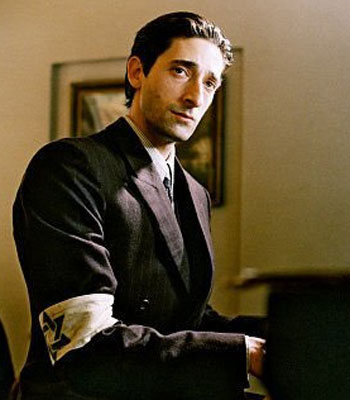Spotlight: The Pianist
In 2002, when The Pianist was released, director Roman Polanski’s 1977 conviction and subsequent flight from sentencing were something of a footnote. Since then, there has been a documentary film about the case, renewed enforcement efforts, new revelations and new charges, and an arrest.

I won’t recount the sordid story, which makes pretty much everyone involved look bad — everyone but Polanski’s victim, now in her mid-forties, who must endure ongoing media attention over something that happened to her when she was 13 years old. Above all, Polanski continues to look bad, and his attempts to explain his side of the story haven’t helped, in my opinion. Pretty much everything I read convinces me that Polanski is a perverse, repellent human being who should have gone to prison a long time ago, and should go to prison today.
The morality of filmmakers has been a point of concern to Christians ever since the Fatty Arbuckle scandal in the 1920s, and it’s certainly true that many filmmakers do lead immoral lives — sometimes notoriously so. Hollywood figures such as Charlie Chaplin, Errol Flynn and Ingrid Bergman have all been the subject of scandal and moral outrage.
Nor is the problem confined to filmmakers. Great painters, musicians and writers have led immoral lives. The Baroque painter Caravaggio, known for such religious masterpieces as The Calling of St. Matthew and The Conversion of St. Paul, was frequently in trouble with the law for violent behavior and once killed a man over a game of tennis. English Catholic and novelist Graham Greene was a notorious philanderer, yet his novels The Power and the Glory and The End of the Affair reflect profoundly on faith and the sinful human condition.
Creativity is a complex and mysterious thing, a gift from God that the artist may use or misuse in many different ways. Some personally immoral artists have used their art to wallow in or justify their own immorality; others have used it to condemn the very faults of which they were guilty or salute the virtues they lacked. Still others have created works of value and significance completely unrelated to the moral character of their lives.
We need not endorse or excuse an artist’s choices or opinions in order to appreciate his or her art. If an artist is a bad person, we ought to recognize that, with whatever social or legal ramifications may be applicable. But if the artist’s work has value, then we ought to recognize that, too. I would not want to be deprived of Modern Times, The Adventures of Robin Hood or Casablanca because of the moral faults of Chaplin, Flynn or Bergman.
Polanski, I said, is a perverse and repellent human being, but he is still a human being, and there is more to him than guilt and perversity. A child of Polish Jews living in Krakow in the 1930s, Polanski endured the terror of the Nazi occupation and separation from his parents, who were interred in the Krakow ghetto — his mother never to return. In 1969, his wife Sharon Tate, eight and a half months pregnant with their first child, was brutally murdered by members of the Manson Family.
This is not in any way to offset his crimes with his own victim status. We can condemn Polanski the sex abuser while recognizing that this is not the whole Polanski. In The Pianist Polanski has something to say and to show to us that is worth hearing and seeing.
Recent
- Benoit Blanc goes to church: Mysteries and faith in Wake Up Dead Man
- Are there too many Jesus movies?
- Antidote to the digital revolution: Carlo Acutis: Roadmap to Reality
- “Not I, But God”: Interview with Carlo Acutis: Roadmap to Reality director Tim Moriarty
- Gunn’s Superman is silly and sincere, and that’s good. It could be smarter.
Home Video
Copyright © 2000– Steven D. Greydanus. All rights reserved.